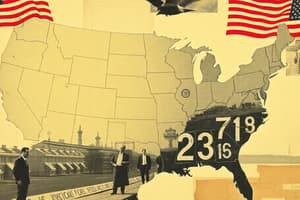Podcast
Questions and Answers
What is Imperialism?
What is Imperialism?
The economic and political domination of a strong nation over weaker ones.
Why do nations want to Imperialize?
Why do nations want to Imperialize?
To gain control of the land and resources of another nation.
What is expansionism?
What is expansionism?
The act or process of increasing or enlarging the extent, number, volume, or scope.
What is Manifest Destiny?
What is Manifest Destiny?
What is a colony?
What is a colony?
Who has political and economical control in a colony?
Who has political and economical control in a colony?
What is a protectorate?
What is a protectorate?
What are the three causes for American Imperialism?
What are the three causes for American Imperialism?
What other reasons (besides the 3) caused American Imperialism?
What other reasons (besides the 3) caused American Imperialism?
What are some political reasons for American Imperialism?
What are some political reasons for American Imperialism?
What are some methods of maintaining political superiority?
What are some methods of maintaining political superiority?
What are some military reasons for American Imperialism?
What are some military reasons for American Imperialism?
What are some methods of maintaining military control?
What are some methods of maintaining military control?
What are some economic reasons for American Imperialism?
What are some economic reasons for American Imperialism?
What are some methods of maintaining economic control?
What are some methods of maintaining economic control?
What is Anti-Imperialism?
What is Anti-Imperialism?
What did opponents of imperialism believe?
What did opponents of imperialism believe?
What methods did the Anti-Imperialists use to maintain peace?
What methods did the Anti-Imperialists use to maintain peace?
What happened in Japan in 1853?
What happened in Japan in 1853?
What happened in the Pacific as trade grew with Asia?
What happened in the Pacific as trade grew with Asia?
What happened in the South Pacific?
What happened in the South Pacific?
What happened in Hawaii in 1893?
What happened in Hawaii in 1893?
Who annexed Hawaii and when?
Who annexed Hawaii and when?
What happened before the Spanish-American War?
What happened before the Spanish-American War?
Flashcards are hidden until you start studying
Study Notes
American Imperialism
- Imperialism: Economic and political domination by a strong nation over weaker ones.
- Motivations for Imperialism: Nations seek control of land and resources from others.
- Expansionism: The process of increasing territorial or political power, often through the acquisition of new lands.
- Manifest Destiny: The belief that it was a nation's divine right to expand territory based on its needs.
- Colony Definition: A group of people living in a new territory while maintaining ties to their parent state.
- Control in Colonies: Political and economic control is held by the imperial power, typically a king.
Protectorate Definition
- A protectorate is a country that is independent yet under the control of another nation.
- Local rulers remain in power but must accept advice from the imperial power in exchange for protection.
Causes of American Imperialism
- Three Main Causes:
- Political: Belief in American cultural superiority.
- Military: The necessity for a large navy for national security.
- Economic: Demand for overseas markets to support economic growth.
- Additional Reasons:
- Youth as a nation since 1776 seeking expansion.
- Competition with European nations that had already expanded overseas.
Political Aspects
- Political Motivations: Include cultural and racial superiority, particularly of Anglo-Saxons, and the desire to impose Western laws and governance.
- Maintaining Political Superiority: Involves manipulation of local leadership and spreading of Anglo-Saxon cultural and political influence.
Military Considerations
- Military Motivations: Desire for military expansion and modernization of naval fleets to protect American business and global shipping interests.
- Methods for Military Control: Use of military force to support or overthrow regimes; establishing overseas military bases.
Economic Factors
- Economic Motivations: Need for new markets, overproduction leading to excess goods, and the pursuit of foreign trade to address unemployment and economic challenges.
- Maintaining Economic Control: Exploiting colonies for resources and making them dependent on the colonizer's goods.
Anti-Imperialism
- Anti-Imperialism Definition: Advocacy for peace over conquest.
- Opponents’ Beliefs:
- The U.S. possessed enough territory already.
- The nation faced significant domestic issues, including immigration and poverty.
- The economy should naturally regulate itself.
- Methods of Staying Peaceful: Influencing through example, supporting rights, and avoiding interference in other nations' domestic issues.
Key Events in Imperialism
- Japan (1853): Isolated nation forced to open trade with the U.S. through Commodore Matthew Perry, leading to the Treaty of Kanagawa allowing U.S. access to two ports.
- Expansion in the Pacific: As trade with Asia grew, the U.S. sought Pacific ports for replenishment during long voyages.
- South Pacific: Negotiations led to the U.S. establishing a base in Pago Pago, Samoa in 1878.
- Hawaii (1893): Overthrow of Queen Liliuokalani by American interests led by Sanford B. Dole. Hawaii was annexed by McKinley in 1898.
Spanish-American War Context
- Pre-War Situation: Spain controlled Cuba and the Philippines, both of which faced revolts in the 1890s. Increasing American investments in Cuban sugar tied the U.S. to the conflict.
- Catalyst for War: The sinking of the USS Maine after an explosion precipitated Congressional support for intervention in Cuba.
Studying That Suits You
Use AI to generate personalized quizzes and flashcards to suit your learning preferences.




